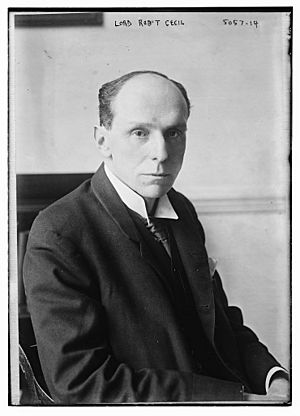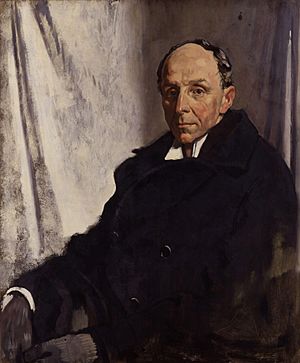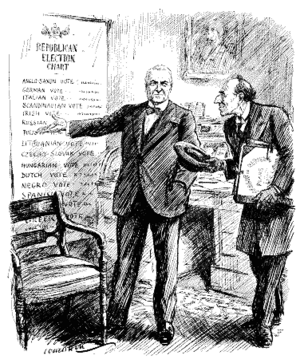Robert Cecil, 1st Viscount Cecil of Chelwood facts for kids
Quick facts for kids
The Viscount Cecil of Chelwood
|
|
|---|---|
 |
|
| Chancellor of the Duchy of Lancaster | |
| In office 10 November 1924 – 19 October 1927 |
|
| Monarch | George V |
| Prime Minister | Stanley Baldwin |
| Preceded by | Josiah Wedgwood |
| Succeeded by | The Lord Cushendum |
| Lord Keeper of the Privy Seal | |
| In office 28 May 1923 – 22 January 1924 |
|
| Monarch | George V |
| Prime Minister | Stanley Baldwin |
| Preceded by | Austen Chamberlain |
| Succeeded by | John Robert Clynes |
| Parliamentary Under-Secretary of State for Foreign Affairs | |
| In office 30 May 1915 – 10 January 1919 |
|
| Monarch | George V |
| Prime Minister | H. H. Asquith David Lloyd George |
| Preceded by | Neil Primrose |
| Succeeded by | Cecil Harmsworth |
| Member of the House of Lords Lord Temporal |
|
| In office 28 December 1923 – 24 November 1958 Hereditary peerage |
|
| Member of Parliament for Hitchin |
|
| In office 23 November 1911 – 6 December 1923 |
|
| Preceded by | Alfred Peter Hillier |
| Succeeded by | Guy Kindersley |
| Member of Parliament for Marylebone East |
|
| In office 12 January 1906 – 15 January 1910 |
|
| Preceded by | Edmund Boulnois |
| Succeeded by | James Boyton |
| Personal details | |
| Born | 14 September 1864 Cavendish Square, London |
| Died | 24 November 1958 (aged 94) Danehill, East Sussex |
| Political party | Conservative |
| Spouse | Lady Eleanor Lambton (1868–1959) |
| Education | Eton College University College, Oxford |
| Profession | Lawyer |
| Awards | Nobel Peace Prize (1937) |
Edgar Algernon Robert Gascoyne-Cecil, also known as Lord Robert Cecil, was a British lawyer, politician, and diplomat. He was born on September 14, 1864, and passed away on November 24, 1958. He played a very important role in creating the League of Nations, an organization that aimed to prevent future wars. For his dedication to peace, he was awarded the Nobel Peace Prize in 1937.
Contents
Early Life and Education
Robert Cecil was born in London. He was the sixth child of Robert Gascoyne-Cecil, 3rd Marquess of Salisbury, who was the Prime Minister three times. Robert Cecil had several brothers, including James Gascoyne-Cecil, 4th Marquess of Salisbury. He was taught at home until he was 13 years old. After that, he spent four years studying at Eton College, a famous school.
Studying Law and Early Career
Cecil went on to study law at University College, Oxford. He was known for being a good debater there. His first job was working as a private secretary for his father, the Prime Minister, from 1886 to 1888. In 1887, he became a lawyer, which is called being "called to the bar" in Britain. He worked as a civil law lawyer until 1906. In 1899, he was made a Queen's Counsel, a special title for experienced lawyers.
Political Beginnings and Beliefs
Robert Cecil strongly believed in free trade, which means countries can trade without special taxes on goods. He disagreed with Joseph Chamberlain's idea of "Tariff Reform," which would have added taxes to imported goods. Cecil thought this idea was unfair and would mostly help the rich.
Becoming a Member of Parliament
In the 1906 United Kingdom general election, Cecil was elected as a Conservative MP for Marylebone East. He wanted to make sure that the idea of free trade stayed important within his party.
Because of disagreements over trade policies, he did not run for the Marylebone seat in the 1910 elections. However, in 1911, he won a special election in Hitchin, Hertfordshire. He served as an MP for Hitchin until 1923.
Working for Peace During World War I
When the First World War started, Robert Cecil was 50 years old, which was too old for military service. Instead, he chose to work for the Red Cross, helping those affected by the war. He was also known for his strong religious beliefs and his commitment to peace.
Joining the Government
In 1915, a new government was formed. Cecil became the Parliamentary Under-Secretary of State for Foreign Affairs. This meant he helped manage Britain's relationships with other countries. He also served as the Minister of Blockade from 1916 to 1918. In this role, he helped create ways to put economic pressure on enemy countries during the war.
Creating the League of Nations

In September 1916, while the war was still going on, Cecil wrote a very important paper. It was called Memorandum on Proposals for Diminishing the Occasion of Future Wars. In this paper, he suggested ideas for preventing future wars. He believed that simply defeating Germany or redrawing borders would not guarantee peace.
Cecil's Ideas for Peace
Cecil proposed that countries should agree to a system where they would discuss their disagreements peacefully. He suggested that if a country started a war without trying to solve the problem peacefully first, other countries should work together to stop them. This could include using economic pressure, like a blockade. He hoped that America would join in this effort to keep peace. Cecil later said this paper was the starting point for Britain's official support of the League of Nations.
In 1917, Cecil suggested that a committee should be formed to look into his ideas for a League of Nations. This committee was set up in January 1918. Their report was shared with American President Woodrow Wilson, who also had similar ideas for a global peace organization.
The Paris Peace Conference
After World War I ended, leaders met at the Paris Peace Conference in 1919. One of their main goals was to create the League of Nations. Robert Cecil was a key figure in these discussions. He helped to draft the Covenant of the League of Nations, which was like the League's rulebook.
Cecil worked closely with American experts to refine the plans for the League. He pushed for important parts of the British ideas to be included. He was disappointed that the British Prime Minister, David Lloyd George, wasn't as enthusiastic about the League as he was.
Cecil also strongly believed that Germany should be allowed to join the League of Nations and that the peace treaty should not be too harsh on them. However, his hopes for a less harsh treaty were not fully met.
Working for the League of Nations Union

Lord Robert Cecil. "I trust that after all we may secure at least your qualified support for our League of Nations?"
U.S.A. President-elect: "Why, what's the matter with ours?"
This cartoon from Punch magazine (1920) shows Cecil talking about the League of Nations.
After returning to Britain, Robert Cecil became very involved with the League of Nations Union. This organization aimed to build public support for the League in Britain. He was the president of the Union from 1923 to 1945. His main goal was to make sure the British government made the League a central part of its foreign policy.
Cecil also wanted to make the Union popular with people from different political backgrounds, not just one group. He even suggested that the League of Nations should consider using Esperanto, an international language, to help people communicate better.
From 1920 to 1922, he represented South Africa in the League Assembly. In 1923, he traveled to the United States to explain the League to American audiences.
Later Political Roles
In 1923, Cecil returned to the government as Lord Privy Seal. This was a special position that had been held by several members of his family before him. In 1924, he was given the title Viscount Cecil of Chelwood, which meant he became a member of the House of Lords.
When the Conservative Party returned to power in 1924, Stanley Baldwin asked Cecil to be Chancellor of the Duchy of Lancaster. In this role, he was responsible for Britain's activities related to the League of Nations.
Resignation from Cabinet
In 1927, there was a naval conference in Geneva to discuss limiting the number of warships. The negotiations failed because the United States and Britain could not agree on how many cruisers Britain needed for its defense. Robert Cecil resigned from the government because he felt the British government allowed the conference to fail instead of trying harder to reach an agreement.
Working for Peace and Disarmament
Even after leaving the government, Cecil continued to work independently to gather public support for the League of Nations. He helped start the International Peace Campaign, which aimed to promote peace around the world. He also wrote several books about the League and his experiences, including The Way of Peace (1928) and A Great Experiment (1941).
Challenges to the League
The Japanese invasion of Manchuria in 1931 was a big challenge to the League of Nations. It showed that the League's rules were being broken. At the World Disarmament Conference in 1932, countries discussed reducing their weapons. However, Britain felt it couldn't stop Japan because it had already reduced its own military.
Cecil was concerned that some people in power were not fully supporting the League. He believed that international cooperation was the only way to prevent future wars.
Views on Appeasement
When Adolf Hitler became Chancellor of Germany in 1933, Cecil still hoped for progress in disarmament. He believed in getting rid of military aircraft and creating an international air force. He also thought Germany should have equal rights in terms of weapons, as long as it was part of a disarmament agreement.
Cecil was a strong critic of the Munich Agreement in 1938, which gave parts of Czechoslovakia to Nazi Germany. He felt it was a shameful moment in British history. He believed that trusting Germany's promises was a mistake, as German diplomacy had often not been based on honesty.
After Germany invaded the rest of Czechoslovakia in 1939, Cecil continued to advocate for stronger international cooperation against aggression. He believed that European countries needed to unite against nationalism.
Later Life and Legacy
In 1946, Robert Cecil attended the final meetings of the League of Nations in Geneva. He famously ended his speech there by saying: "The League is dead; long live the United Nations!" This marked the end of the League and the beginning of the United Nations.
He lived for 13 more years, continuing to support international peace efforts through the United Nations Association. In his last speech in the House of Lords in 1953, he spoke about his commitment to world peace. He believed that lasting peace must be based on Christian values and that countries needed to work together.
Honors and Awards
Robert Cecil received many honors throughout his life. He was made a Companion of Honour in 1956. He also served as the Chancellor of the University of Birmingham and the Rector of the University of Aberdeen. In 1924, he received the Peace Award from the Woodrow Wilson Foundation.
His most significant award was the Nobel Peace Prize in 1937, recognizing his tireless work for peace and the League of Nations. He also received honorary degrees from many universities around the world.
Robert Cecil passed away on November 24, 1958. He had no children, so his title of Viscount ended with him.
Tributes to a Peacemaker
Many people paid tribute to Robert Cecil after his death. Viscount Alexander of Hillsborough said that Cecil was completely dedicated to the cause of peace and establishing brotherhood among people. Clement Attlee, another important politician, said that the whole world had lost a great man and friend. He added that wherever peace is mentioned, Lord Cecil's name would always come up.
Works by Robert Cecil
- Our National Church (1913)
- The Way of Peace (1928)
- A Letter to an M.P. on Disarmament (1931)
- A Great Experiment (1941)
- All the Way (1949)
Images for kids
See also
 In Spanish: Robert Cecil para niños
In Spanish: Robert Cecil para niños
 | John T. Biggers |
 | Thomas Blackshear |
 | Mark Bradford |
 | Beverly Buchanan |


